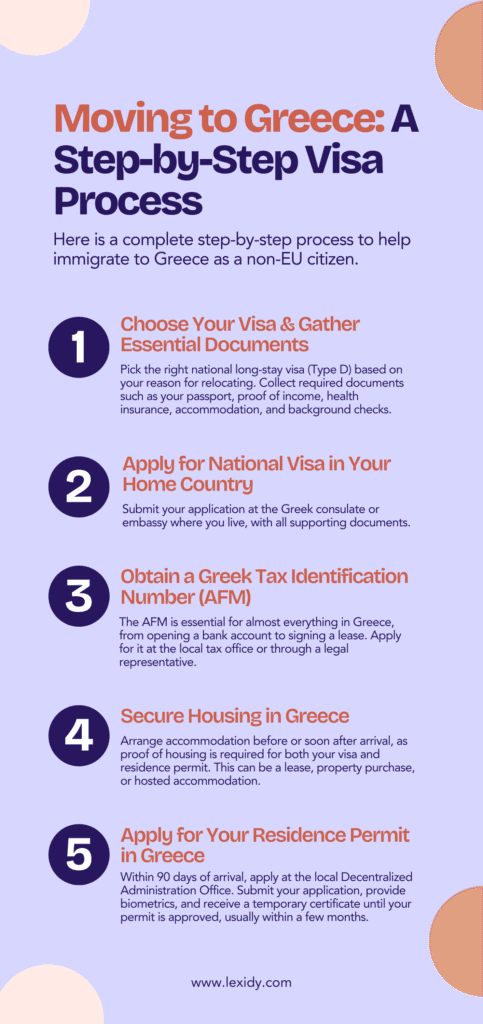Immigrating to Greece has become increasingly popular for non-EU nationals seeking a slower pace of life, lower living costs, and a safe, welcoming environment. From lively Athens to the islands, Greece blends rich history with modern conveniences, making it a top choice for expats.
In recent years, more retirees, digital nomads, and remote workers, especially Americans, have started moving to Greece from the US to take advantage of flexible Greece visas. Whether you want to work remotely, invest, or retire by the sea, there are multiple legal pathways to residency.
This guide explains how to immigrate to Greece, the visa options available, and what you need to know if you’re considering a new chapter in this timeless European destination.
Table of Contents
How to Immigrate to Greece: Visa Options for Non-EU Citizens
Do I Need a Visa for Greece?
Citizens of many countries, including the U.S., Canada, United Kingdom and Australia, can enter Greece without a visa for short stays. As part of the Schengen Area, Greece allows visa-free travel for up to 90 days within any 180-day period for tourism, business, or family visits.
If you plan to stay in Greece for more than 90 days, whether you are working, retiring, studying, or joining your family, you will need to apply for a national long-stay visa (D visa) and obtain a residence permit. The visa category you choose will depend on your reason for relocating, and each option has specific eligibility requirements.
Main Residency Options for Non-EU Citizens
Greece offers various legal immigration routes tailored to different personal and professional circumstances. Here are the most common long-term visa options for non-EU citizens:
- Financially Independent Person (FIP) Visa: This was created for retirees or individuals with stable passive income from outside Greece. It requires proof of sufficient financial means and private health insurance.
- Digital Nomad Visa: Designed for remote workers employed or self-employed outside Greece. Applicants must show stable income and the ability to work independently online.
- Golden Visa (Investment Residence Permit): Grants residency through a qualifying investment, typically in real estate or Greek businesses. Ideal for high-net-worth individuals seeking EU mobility and long-term options.
- Student Visa: For non-EU nationals enrolled in accredited Greek universities or academic programs. Proof of enrollment and financial means is required.
- Work Permit (Employment-Based Visa): For non-EU nationals with a Greek job offer. In general, you need employer sponsorship; however, there are some exceptions.
- Family Reunification Visa: For spouses, children, or dependents joining a family member who legally resides in Greece.
Each visa leads to a residence permit and may offer a pathway to long-term stay or eventual citizenship, depending on your legal status and duration of residency.
Need help meeting the Greek visa requirements? Let our legal team guide you through each step.
Immigration Process: Legal Steps to Get Residency in Greece

Once you’ve chosen the visa category that fits your situation, the next stage of immigrating to Greece is following the legal process for residency. Here’s a step-by-step overview for non-EU citizens.
Step 1: Choose Your Visa & Gather Documents
Select the appropriate national long-stay visa (Type D) based on your reason for relocating. Options include work, financial independence, digital nomad, study, investment, or family reunification. Then collect the required documents, which usually include:
- Valid passport
- Birth or marriage certificates (if applicable)
- Bank statements or proof of financial means
- Proof of accommodation in Greece
- Private health insurance that meets residency requirements
- Criminal background check from your home country
- Visa-specific documents (such as a work contract, proof of remote work, or investment records)
Note: Some documents may need to be translated into Greek and legalized with an apostille.
Step 2: Apply for a National Visa in Your Home Country
Submit your Type D visa application at the Greek consulate or embassy in your country of residence.
If you’re immigrating to Greece from the USA, this means applying through the Greek consulates in cities such as New York, Chicago, or San Francisco. Applications may include an interview and supporting documents.
Step 3: Obtain a Greek Tax Identification Number (AFM)
The AFM is required for nearly all official activities in Greece, from signing a lease and opening a bank account to registering for utilities. You can apply for it at a local tax office or through a legal representative.
Step 4: Secure Housing in Greece
Arrange accommodation before or shortly after arrival. Proof of housing is required for both your visa and residence permit application, whether through a rental contract, property deed, or hosted accommodation.
Step 5: Apply for Your Residence Permit in Greece
Once you’ve entered Greece on your visa, apply for your residence permit at the local Decentralized Administration Office. This must usually be done within 90 days of arrival. During this step:
- Your full application is submitted
- Biometric data (fingerprints and photos) are collected
- You receive a temporary certificate confirming your legal stay while your permit is being processed
Processing times vary but often take several months. Once approved, you’ll receive your residence permit card, allowing you to reside legally in Greece under your chosen visa category.
Greek immigration law can be tricky — get expert legal guidance for your move to Greece.
Living as an Expat in Greece: What to Expect

Relocating to Greece is becoming increasingly attractive for non-EU nationals. Beyond its natural beauty and strategic location, immigrating to Greece also comes with practical realities expats should understand before making the move.
Where Do Expats Live?
Greece offers diverse living environments, from cosmopolitan cities to tranquil islands:
- Athens is the country’s capital, and offers a dynamic mix of modern and ancient life, international schools, and a growing tech and startup scene.
- Thessaloniki is second-largest city in Greece, and is known for its cultural events, laid-back vibe, and vibrant food scene.
- Crete is the largest Greek island, popular among retirees and digital nomads for its mild winters and strong local community.
- Peloponnese is an ideal choice for those seeking peace, nature, and affordable rural properties, especially around towns like Nafplio or Kalamata.
Cost of Living: Greece vs. Western Countries
Greece remains one of the most cost-effective places to live in the EU. Everyday expenses in Athens are far lower than in other major global cities such as New York, London, Toronto, or Sydney.
| Category | Greece (Athens Avg.) | United States (NYC Avg.) | United Kingdom (London Avg.) | Canada (Toronto Avg.) | Australia (Sydney Avg.) |
| Rent (1BR apartment city centre) | €500–€700/month | US $4,400–4,570/month | £2,200–£2,600/month | C$1,900–2,300 | A $2,300–2,820 |
| Utilities (basic) | €100–€150/month | US $150–$220/month | £150–£250/month | C$150–200/month | A$300/month |
| Public Transport Pass | €30/month | US $127/month | £180–£200/month | C$100/month | A$150–170 |
| Dining Out (mid-range) | €30 for two | US $80 | £70 | C$70 | A$80 |
| Private Health Insurance | €50–€100/month | US $380–510 | £150–£250 | CAD $100–300 | A$150–525 |
Note: Exchange rates as of 2025. Some goods, such as electronics, may cost more in Greece due to import taxes and energy prices.
Healthcare and Public Services
Residents in Greece have access to both public and private healthcare:
- Public system (EOPYY): Available once insured through social security (employees or self-employed).
- Private healthcare: Widely used by expats due to shorter wait times and English-speaking staff. Private insurance is also a requirement when applying for most Greece visas.
- Public services: Transportation and postal services are generally reliable, though occasional strikes and bureaucratic delays can affect them.
Expat Community Resources
Settling in is easier thanks to an active expat Greece network:
- Facebook groups and expat meetups in Athens, Thessaloniki, and Crete.
- International schools, coworking spaces, and language exchange groups in major cities.
- Local cafés and village squares as natural community hubs.
Common Challenges for Expats
While life in Greece can be idyllic, newcomers should prepare for:
- Bureaucracy: Paper-based processes and slow administration are common. Patience and legal assistance go a long way.
- Language barriers: English is widely spoken in cities, but learning basic Greek improves daily life and official interactions.
- Banking and payments: Opening a Greek bank account requires documentation and patience, and not all cards are accepted everywhere.
Long-Term Residency and Citizenship Pathways
Immigrating to Greece opens the door to long-term settlement and, eventually, the possibility of citizenship. To reach this stage, you must meet the legal and integration requirements at each step.
Temporary Residence Permits
Most Greek residence permits are initially issued for up to three years, depending on your visa category. These can be renewed in three-year increments as long as you continue to meet the conditions, such as sufficient income, private health insurance, and legal residence in Greece.
Permanent Residency After 5 Years
AfterAfter five consecutive years of legal residence in Greece, you may apply for a long-term EU residence permit. To qualify, you must demonstrate:
- Continuous, uninterrupted residence
- Stable financial resources
- Sufficient integration (language and social inclusion)
- Health insurance coverage
This status provides stronger rights than standard permits, including mobility within the EU.
Greek Citizenship After 12 Years
For most applicants, Greek citizenship requires 12 years of continuous legal residence. Some categories may qualify sooner, including:
- Three years in specific cases (such as marriage to a Greek citizen with children)
- Seven years for investors under the Golden Visa program, provided they physically reside in Greece and register accordingly
In addition to meeting the residency timeline, applicants must also demonstrate:
- Integration into Greek society (such as cultural knowledge and community participation, important for the expat Greece community)
- Language proficiency at B1 level in Greek
- A clean criminal record and compliance with tax obligations
The process involves submitting an application, passing exams, and undergoing administrative review. For Americans moving to Greece from the US, these timelines and requirements are the same as for other non-EU nationals.
Important Note on the Golden Visa
The Greece Golden Visa grants residency through specific investments and does not require a minimum annual stay. While this flexibility is attractive, time only counts toward citizenship eligibility if the investor actually resides in Greece and maintains registered tax and social ties. Simply holding the visa without living in Greece will not reduce the timeline.
How Our Legal Team Can Help

Immigrating to Greece involves more than just paperwork. The process requires planning, legal compliance, and careful documentation. At Lexidy, our legal team provides comprehensive, personalized support at every stage of the process.
What We Offer:
- Tailored immigration advice based on your visa category, family situation, and long-term goals.
- Full visa application support, from consular filings to in-country residence permit procedures.
- Document handling, including certified translations, apostilles, and notarization of international records.
- Relocation assistance, including property searches, rental contracts, and bank account setup for clients planning a long-term stay in Greece.
Whether you’re a retiree, investor, or remote worker, our team simplifies the journey so you can focus on your new life in Greece.
Need Help Immigrating to Greece in 2025?
Greece remains one of the most welcoming destinations in Europe for non-EU citizens. Whether you are retiring, working remotely, investing, or studying, there are multiple Greece visas available, including the Digital Nomad Visa, Golden Visa, and Financially Independent Person (FIP) Visa, that make immigrating to Greece possible.
The pathways are clear, but the process requires careful preparation. From gathering the right documents and meeting income thresholds to submitting your application at a Greek consulate and applying for your residence permit, every step matters.
To avoid delays or rejections, it’s best to move forward with experienced legal support. Our team of Greece immigration experts helps clients navigate each stage with confidence and clarity.
Ready to begin your new life in Greece? Fill out the form below and one of our specialists will be in touch to guide you through the process.

